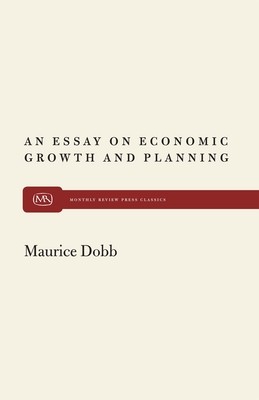
- We will send in 10–14 business days.
- Author: Maurice Dobb
- Publisher: Monthly Review Press
- ISBN-10: 0853451176
- ISBN-13: 9780853451174
- Format: 14 x 21.6 x 0.8 cm, softcover
- Language: English
- SAVE -10% with code: EXTRA
Reviews
Description
This important essay dates from the end of the fifties. During this era,
the dominant theories of economic growth were based on conditions of
private ownership of capital and where investment is primarily under the
control of private individuals or firms. Dobbs, however, considers the
alternatives. He asks: Do such theories have a more universal
application? Can they be applied to planned economies? If they can, in
what form may such an application be made? Half a century later, with
the global regime of unfettered international capital markets in a state
of utter collapse, the time has come for a return to the possibility of
rational social and economic planning. This short clear book is again a
necessary theoretical starting point for a post-capitalist future.
EXTRA 10 % discount with code: EXTRA
The promotion ends in 19d.06:33:46
The discount code is valid when purchasing from 10 €. Discounts do not stack.
- Author: Maurice Dobb
- Publisher: Monthly Review Press
- ISBN-10: 0853451176
- ISBN-13: 9780853451174
- Format: 14 x 21.6 x 0.8 cm, softcover
- Language: English English
This important essay dates from the end of the fifties. During this era,
the dominant theories of economic growth were based on conditions of
private ownership of capital and where investment is primarily under the
control of private individuals or firms. Dobbs, however, considers the
alternatives. He asks: Do such theories have a more universal
application? Can they be applied to planned economies? If they can, in
what form may such an application be made? Half a century later, with
the global regime of unfettered international capital markets in a state
of utter collapse, the time has come for a return to the possibility of
rational social and economic planning. This short clear book is again a
necessary theoretical starting point for a post-capitalist future.


Reviews